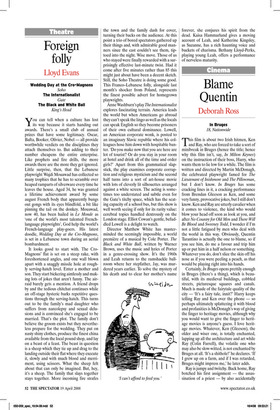Foreign folly
Lloyd Evans
Wedding Day at the Cro-Magnons Soho The Internationalist Gate The Black and White Ball King’s Head
You can tell when a culture has lost its way because it starts handing out awards. There’s a small club of annual prizes that have some legitimacy. Oscar, Bafta, Booker, Olivier, Nobel — all provide worthwhile verdicts on the disciplines they attach themselves to. But adding to their number cheapens the entire enterprise. Like prophets and fire drills, the more awards there are the more they get ignored. Little surprise, then, that the Lebanese playwright Wajdi Mouawad has collected so many trophies that he has to scramble over heaped ramparts of silverware every time he leaves the house. Aged 34, he was granted a lifetime achievement award by some august French body that apparently bungs out gongs with its eyes blindfold, a bit like pinning the tail on the donkey. Mouawad, now 40, has been hailed in Le Monde as ‘one of the world’s most talented Frenchlanguage playwrights’, God help the world’s French-language play-goers. His latest doodle, Wedding Day at the Cro-Magnons, is set in a Lebanese town during an aerial bombardment.
It looks good to start with. The CroMagnons’ flat is set on a steep rake, with foreshortened angles, and one wall blown apart with a snaggly missile hole at roughly serving-hatch level. Enter a mother and son. They start bickering aimlessly and making lots of jokes that aren’t funny. The airraid barely gets a mention. A friend drops by and the tedious chitchat continues while an off-stage hysteric barks repetitive questions through the serving-hatch. This turns out to be the family’s mad daughter who suffers from narcolepsy and sexual delusions and is convinced she’s engaged to be married. That’s the plot. The family don’t believe the groom exists but they nevertheless prepare for the wedding. They put on nasty shiny clothes, produce the finest china available from the local pound shop, and lay on a beast of a feast. The beast in question is a sheep which they tie up and drag to the landing outside their flat where they execute it, slowly and with much blood and merriment, using scissors. What the sheep felt about that can only be imagined. But, hey, it’s a sheep. The family that slays together stays together. More incoming fire strafes the town and the family dash for cover, turning their backs on the audience. At this point a trio of bored spectators gathered up their things and, with admirable good manners since the cast couldn’t see them, tiptoed into the night. Wise move. Those of us who stayed were finally rewarded with a surprisingly effective last-minute twist. Had it come after five minutes rather than 85 this might just about have been a decent sketch. Still, the Soho Theatre is doing some good. This Franco–Lebanese folly, alongside last month’s shocker from Poland, represents the finest possible advert for homegrown playwrights.
Anne Washburn’s play The Internationalist explores fascinating terrain. America leads the world but when Americans go abroad they can’t speak the lingo as well as the locals can speak English so they become prisoners of their own cultural dominance. Lowell, an American corporate wonk, is posted to an imaginary Slavic republic where his colleagues hose him down with hospitable banter. ‘Do you make now that you are here are lot of tourist? Or do you stay in your room at hotel and drink all of the time and order girls?’ Apart from this grammatical slapstick, the play examines corporate corruption and religious mysticism and the second half turns into a sort of art-house movie with lots of cleverly lit silhouettes arranged against a white screen. The acting is sometimes too understated and subtle even for the Gate’s titchy space, which has the seating capacity of a school bus, but this show is well worth seeing if only for its rarity value: cerebral topics handled dextrously on the London stage. Elliot Cowan’s gentle, befuddled Lowell is a delight to watch.
Director Matthew White has masterminded the seemingly impossible, a world première of a musical by Cole Porter. The Black and White Ball, written by Warner Brown, uses the music and lyrics of Porter in a genre-crossing show. It’s the 1960s and Leah returns to the ramshackle ballroom where her stepfather, Jay, was murdered years earlier. To solve the mystery of his death and to clear her mother’s name forever, she conjures his spirit from the dead. Kaisa Hammarlund gives a moving account of Leah, and Katherine Kingsley, as Suzanne, has a rich haunting voice and buckets of charisma. Bethany Lloyd-Perks, playing young Leah, offers a performance of nerveless maturity.


















































































 Previous page
Previous page